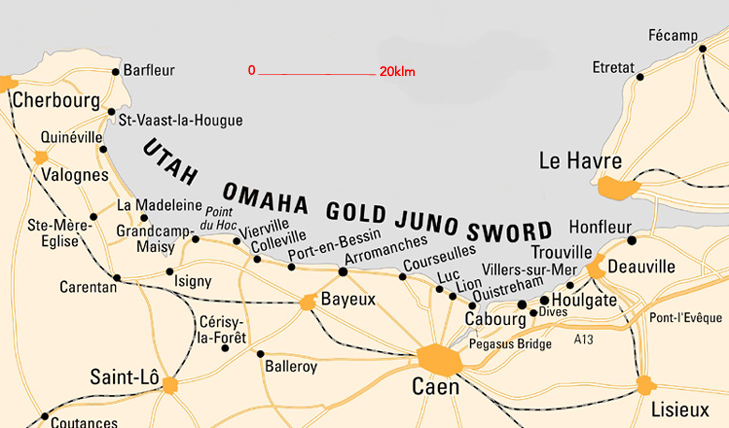Cross Words

A four letter word meaning “one of the U.S.,” read the clue. The answer? “Utah.”
Five letters: “Red Indian on the Missouri.” That one is “Omaha.”
What do Utah and Omaha have in common? Not much, until you realize the context.
Those two clues were found in crossword puzzles published in the United Kingdom in May of 1944, while the world and, in particular, the British military, were in the throes of war. Themselves, the clues were at most an eerie coincidence portending the Allied D-Day invasion planned for early June of 1944 — an invasion, codenamed Operation Overlord, in which troops would land on the beaches of Normandy, France, two of which were themselves codenamed “Utah” and “Omaha,” as seen above. But the coincidence would become increasingly suspicious.
The author of both crosswords, a schoolmaster named Leonard Dawe, had been interrogated two years prior by British intelligence for another coincidence. In August of 1942, one his clues — six letters, meaning “French port” — had the answer “Dieppe.” Two days later, Allied troops mainly from Canada raided that exact port, which was then controlled by the Germans, with disastrous results. Of the roughly 6,000 infantrymen who made it ashore, well over 3,000 of them were killed, wounded, or captured, and the Royal Air Force lost nearly 100 planes, mostly to ground-based flak cannons. Dawe was suspected of tipping off the enemy via the crossword puzzles, but the investigation suggested that this was a mere coincidence.
But when the code words of two of the Operation Overlord beaches appeared in the paper, attentions again focused on Dawe. By the end of May, two more code words would appear in his crosswords. Next was “Mulberry,” the code name for a floating harbor used in the Normandy landings. And then, incredibly, there was a clue demanding an eight letter word meaning “big-wig” — the answer was the term “overlord.” When a fifth clue — “Neptune,” the code word for the naval support component of the operation — appeared on June 1st, Dawe found himself the subject of an investigation once again.
A review of earlier crossword puzzles showed that Dawe had used the code words for the three other beaches — Gold, Juno, and Sword — over previous months. But Dawe staunchly asserted his innocence, claiming the clues to be a strange coincidence; when he was asked why he chose those terms, he protested with “why not?,” as if to say that in his view, there was nothing particularly unique to that set of words. In short, he claimed that the terms had no secondary meaning to him. He was never charged with any crime nor was he incarcerated.
The odd occurrence may not have been malicious, but there’s some evidence that it was not purely random. Per one account (see the footnote here), supported by this report in the Guardian, Dawe would regularly ask his students for interesting words for inclusion in his puzzles. During the war, many soldiers were quartered with these students’ families, and it’s likely that the soldiers were using the code words openly (after all, the whole point of the code word is to obfuscate the true location/meaning of the term), and the students picked up on the interesting words.
Bonus fact: Most areas use the familiar black-and-white box crossword puzzle style that you are probably familiar with, and certainly were in use in by Dawes and his British contemporaries. But in Sweden, a different style is used. Seen here, the clues themselves are embedded in the puzzle, with arrows pointing in the direction that the answer should be recorded; also, any dead squares are grouped toward the middle and not shaded in black.
From the Archives: Soothsaying Crossword: Another crossword which predicted the future, although in this case, intentionally.
Related: Crossword puzzle books.
